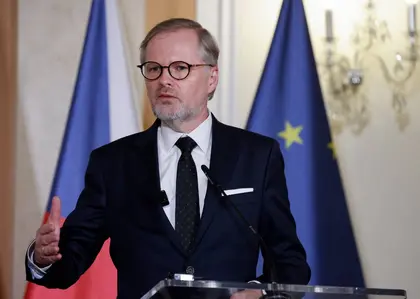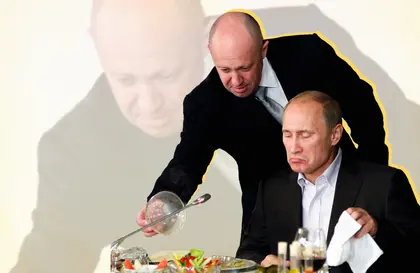A report by Bloomberg news on Nov. 9 examines how insiders are frightened by the emergence of vocal hardliners in the Russian administration. The elites are worried that President Vladimir Putin will acknowledge the hawks’ calls for ramping up hostilities abroad while imposing harsh persecution for citizens in Russia.
The report states that high-ranking corporate leaders and public officials have been watching officials they once deemed neutral, like Wagner founder Yevgeny Prigozhin, with growing concern.
JOIN US ON TELEGRAM
Follow our coverage of the war on the @Kyivpost_official.
Some wealthy Russians claimed that they were concerned for their own well-being and the safety of their families as a result of Prigozhin’s public calls for “urgent Stalinist repressions” against business tycoons who aren’t enthusiastic enough to support the war effort against Ukraine.
Rising fears within the bureaucracy about the Kremlin’s reluctance or inability to protect its own has risen in response to Prigozhin’s open attacks on top military commanders, some of whom have since been dismissed, the report writes.
The report also highlights that authorities discreetly enquired as to the safety of relatives during the call-up of 300,000 reservists, as they were hesitant to publicly acknowledge that they had sent their military-age children overseas.
President Putin has claimed that, at least temporarily, the recruitment is over. Yet many in the corporate and administrative class are anxious that the militarization of the economy and society is just increasing.

Czechs Complete Pipeline to Replace Russian Oil Supply
Despite the absence of any military coup one might traditionally associate with a military dictatorship, one senior government official, who asked to remain nameless out of fear of backlash, said the country’s current situation is comparable to one, according to Bloomberg.
The report also says that Russian state officials are now referring to the attack on Ukraine as a “people’s war,” echoing Josef Stalin’s propaganda during World War II.
Some insiders even claim they worry that widespread expulsions and imprisonments, as occurred during the Soviet dictator’s rule, may soon follow.
Similar to Stalin’s war cabinet, Putin’s special commission of senior government and security officials was established to coordinate economic strategy to support the military and defense sector.
A political scientist named Ekaterina Schulmann, who left Russia in the early stages of the conflict, commented on this: “The state has lost the monopoly on legalized violence, and new operators of this former monopoly have appeared… It’s strange that Putin is encouraging this.”
Many in the Kremlin are in favor of what they regard as a struggle for Russia’s own existence, and they believe there is no other course of action than to keep applying pressure until Ukraine and its backers in the U.S. and Europe surrender.
According to insiders, this is why the growing worry over the outlook so far hasn’t materialized into anything resembling internal resistance to Putin’s ongoing escalation, the report reveals.
Some government figures who were earlier considered to be rather liberal, like Sergei Kiriyenko, the deputy chief of staff at the Kremlin, have turned out to be ardent war supporters in public.
After nearly nine months of fighting, the business and financial elites have grown increasingly convinced that Putin’s war was a disastrous mistake that would condemn the country to isolation and weakness.
The report also argues that according to those close to the administration, even within the government there are many who silently reject the battle but are too afraid to speak up.
In order to maintain positive relationships with the Kremlin and keep factories open, tycoons have tried to avoid getting involved in politics, the report reveals. Indeed, few people have publicly criticized the war from outside the country.
As tensions rise beneath the surface, government technocrats have been tasked with modifying economic and budgetary plans to account for the steadily growing shift of resources toward the war’s financing. Additionally, they have been tasked with computerizing the mobilization procedure in order to prevent a repetition of the chaos and errors that marred the initial deployment.
Tatyana Stanovaya, founder of the political consulting firm R Politik, offered the following insight for the recent revelation: “The mood of doom that everything has turned out this way is very strong.”
The report concludes that overall, insiders describe the Russian president as becoming more and more isolated, encircled by a select minority of hardliners, and unwilling to listen to opposing viewpoints. The Russian government has given up trying to shield the nation from the reality of the conflict for months as its forces struggle to contain a Ukrainian counteroffensive.
You can also highlight the text and press Ctrl + Enter










